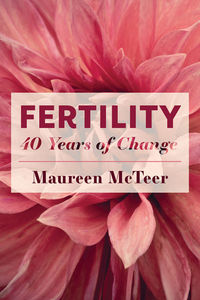"This is the Challenge of this Century" Maureen McTeer's New Book Explores Ethical & Legal Questions around IVF
As medical innovations, in particular in vitro fertilization, help provide options to prospective parents struggling with fertility issues, a host of legal and ethical questions come into play. Embryo research and the emerging ability to manipulate the human genome mean that for every increase in access and improved health outcomes, there are accompanying issues of policy and to what extent—and under whose guidelines—medical intervention can and should occur. Helping prospective parents conceive seems like something everyone can agree on, but when genetic screening, embryo selection, and genome alteration enter the conversation, discussions become more nuanced.
In law professor Maureen McTeer's Fertility: 40 Years of Change (Irwin Law), McTeer attempts to help readers, potential parents, and those interested in the ethical and legal implications of fertility innovations navigate the complex landscape. With the first "IVF baby" reaching just 44 years old this year, this conversation is still in its early stages compared to many other discussions in medical ethics, and constant innovation means changes continue to come into play. The consequences for relationships, social structures, legal and financial set ups, research, and more will continue to evolve and McTeer helps readers anticipate and discuss some of the most fascinating—and potentially thorny—aspects of that evolution.
We're welcoming Maureen to Open Book today to discuss Fertility: 40 Years of Change today as part of our True Story nonfiction series. She tells us about how her interest and involvement in IVF discussion first came about as early as the 1990s, what two central questions her book grapples with, and the personal connection that sparked the decision to write Fertility.
Open Book:
Tell us about your new book and how it came to be. What made you passionate about the subject matter you're exploring?
Maureen McTeer:
My new book Fertility: 40 Years of Change (Irwin Law, 2022) is the story of how one reproductive technology, namely in vitro fertilisation, (IVF) has revolutionized how and who can reproduce, and opened a whole new world of research on IVF created human embryos.
I served as an original member of the federal Royal Commission on New Reproductive Technologies in the early nineties. It is there that I became interested in all aspects of reproductive technologies, their benefits and risks; and the research underway to alter the genetic make-up of human embryos to remove genetic anomalies that can lead to mild, serious, or even fatal results in children born with these genes.
OB:
Is there a question that is central to your book? And if so, is it the same question you were thinking about when you started writing or did it change during the writing process?
MM:
There are at least two central questions that are addressed in my book. The first is the need to find a way to regulate this powerful technology to ensure safety for the women involved and access to those who need it in order to have a child. The second is how, and by whom, should society decide the fate of future generations, increasingly possible through the genetic engineering of human embryos.
OB:
What was your research process like for this book? Did you encounter anything unexpected while you were researching?
MM:
I decided to write this book as a pandemic project, when we were all confined to home to protect ourselves from the deadly Covid virus. I have taught and lectured at law schools in Canada and the U.S. for many years, and so had copious notes already available to begin the process. Irwin Law owner and publisher Jeffrey Miller agreed to publish the book, initially as a follow-up to a previous book I had written on a wide range of health and medical issues. I already knew what I wanted to say, and spent the 18 months between March 2020 and the end of 2021 researching current information to make my case.
Your CanLit News
Subscribe to Open Book’s newsletter to get local book events, literary content, writing tips, and more in your inbox
OB:
What do you need in order to write – in terms of space, food, rituals, writing instruments?
MM:
I am a very organized person and need a writing space that respects that need. I cannot write surrounded by mess. This personal approach and legal/policy focus suited the book’s form and content very well. I established a disciplined approach to my day, made easier by the fact that we had few, if any, speaking or social engagements during those 18 months. Zoom was the only intruder into my daily routine. To my surprise, the lock-down period served me well, as virtual lectures from experts around the world, that I could access through Zoom, were of incredible assistance to my research.
OB:
What do you do if you're feeling discouraged during the writing process? Do you have a method of coping with the difficult points in your projects?
MM:
It is inevitable that an author will become discouraged at some points in the writing process. While I did not suffer from the dreaded “writer’s block” at all, there were certainly days when the sheer weight of the lock-down left me feeling lonely and sad. On those days I would go for a walk or putter around the garden. I grew up in the country, and need the peace and quiet, as well as the comforting beauty and variety provided by Nature around me.
Fortunately, my husband’s office was just upstairs in our home, and he was able to offer encouraging words on these few occasions. It helps to have a partner who has also written books and knows that it is an arduous task, with good days when the words just fly onto the page, and other days when ideas and words choose to go into hiding.
OB:
Do you remember the first moment you began to consider writing this book? Was there an inciting incident that kicked off the process for you?
MM:
This particular book has been percolating on the periphery of my imagination for some time. I believe it was a discussion with a friend whose daughter was considering IVF to overcome her inability to conceive that really reminded me that I could add to the public policy and legal discussion. Infertility is on the rise, in part because women are older when they start to try to conceive. As a medical friend has always insisted, “age is the number one cause of infertility”. With the majority of women working during their prime reproductive years, that is not likely to change.
But helping provide relevant information to women seeking fertility treatments was but a part of the reason I felt it was important to write this book. Medical research has moved society to the point where we must now decide if we will change our laws to allow scientists to alter the human genome and pass those changes onto our future generations. To me, this is the challenge of this century. Many have begun the subtle (and not so subtle) lobbying for this to happen. Rather than feel powerless against such forces, because I am neither a scientist or an ethicist, I decided to write this book to encourage others to act as well. We will see if the public is willing and able to reflect and act to help guide the future use of these all-powerful technologies. I hope my book can add to that public reflection.
OB:
What are you working on now?
MM:
At the moment, I am working on a novel. I have finished the first draft and am looking for a seasoned editor to help me perfect it for publication. During the pandemic, I also wrote a dozen short stories on the theme of “leave taking”, which built into my other research and lecturing on end-of-life issues, including choices we reflect upon when considering the end of our lives. (It is not as morose as it sounds!) Finally, I have written a short children’s story about a mother duck and her struggle to find a place to lay her eggs and raise her ducklings in an urban setting with ever present social media.
______________________________________________
For more than four decades, Maureen McTeer has been a leading advocate and role model for gender equality in Canada. She remains a strong advocate for greater public funding for all aspects of women’s health and care, and a staunch defender of women’s health and reproductive rights.
She is an expert on medical law and public policy, was an original member of the federal Royal Commission on New Reproductive Technologies, and was a member of the Global Commission on Pollution, Health and Development.
Her interests and activism span a wide range of social, legal, and ethical issues, where science and society intersect. As a dedicated social activist, Ms. McTeer urges Canadians to participate actively in shaping policies and laws that affect them and others in their communities. Leading by example, she has served on many not-for-profit boards, including as co-chair of the National Experts Commission of the Canadian Nurses Association; as a founding member and chair of the Advisory Board of the Shirley E. Greenberg Women’s Health Centre in Ottawa; as a lay member of the National Council of the Society of Obstetricians and Gynecologists of Canada and of the Accreditation Committee of Canadian Medical Schools; as a member of the Board of Governors of the University of Ottawa and the Ottawa Heart Institute; as the Canadian representative of the international White Ribbon Alliance for Safe Motherhood; and as the national patron of the Canadian Osteoporosis Society.






